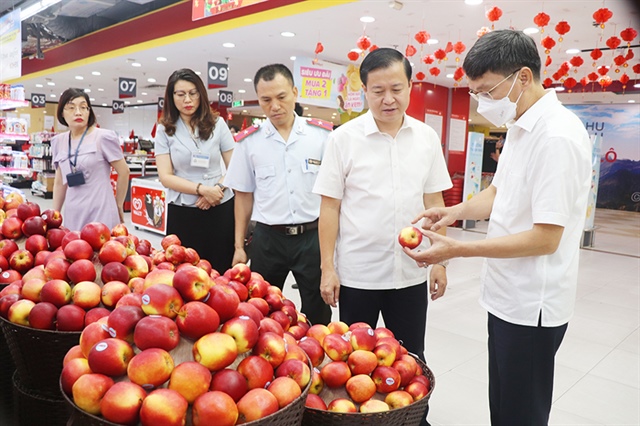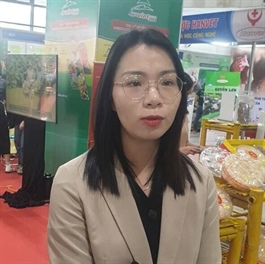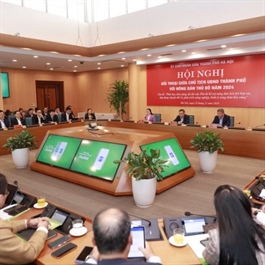Hanoi controls fruit traders to ensure safety
Hanoi controls fruit traders to ensure safety
By encouraging all stakeholders to co-operate, Hanoi aims to improve food safety standards and protect public health.
Hanoi is stepping up efforts to regulate fruit sales, ensure product quality and place of origin, and enforce a ban on unlicensed fruit vendors to create a transparent fruit market.

A fruit stall at Ha Dong market. Photo: Bich Hoi/The Hanoi Times |
The city's project to enhance the management of fruit shops in Hanoi by 2025 seeks to have 100% of fruit shops certified with a "safe fruit shop" label. Under the plan, all registered fruit vendors will be required to undergo health checks and food safety training.
Nguyen Kieu Oanh, Deputy Director of Hanoi's Department of Industry and Trade, said the department will help fruit shops obtain the certification label. She added that by the end of 2024, the department will publish the names of certified establishments and those that fail to comply with food safety regulations so that consumers can make informed choices when shopping.
Oanh said the department would continue to disseminate regulations on fruit management and sales through the media.
The city has continuously reviewed and updated its database of fruit vendors to assess their operational status and assist them in adhering to the regulations.
In addition to labeling, the department will step up its supervision and inform the public of any potential hazards to the safety and quality of fruit sold in Hanoi. Those who fail to comply will face strict inspections and penalties.
According to the Hanoi Department of Industry and Trade, there are nearly 1,500 fruit shops in the city, of which more than 1,380 have been certified as meeting food safety standards or have pledged to do so.
Strengthening inspections and enforcement

Vu Cao Cuong, Deputy Director of the Hanoi Department of Health, inspects Winmart supermarket at Vincom Nguyen Chi Thanh. Photo: VGP |
According to the Hanoi Market Surveillance Department, authorities from the Hanoi Steering Committee 389 have intensified inspections and supervision of fruit sales throughout the city. These efforts include raising awareness helping vendors comply with guidelines for safe fruit sales, and strictly punishing breaches of food safety regulations.
Specifically, market surveillance teams investigated 21 cases of fruit-related offenses, resulting in fines totaling VND292 million ($11,438). The total value of seized goods was VND270.9 million (US$10,694), including plum mangoes, dried apples, raisins, red apples, oranges, and pears of unknown origin.
Local governments have also ramped up inspections to ensure that fruit retailers comply with food safety regulations, especially during peak periods of food safety enforcement.
However, Chu Xuan Kien, Director of the Hanoi Market Surveillance Department, said that the fruit supply chain involves multiple channels, including air and road transport, as well as wholesale markets. He pointed out that food safety staff at district and commune levels are often understaffed and lack expertise, which complicates the inspection process.
"Most small fruit sellers source their products from wholesale markets rather than directly from producers, which makes traceability more cumbersome," he said. "In addition, many vendors often buy in small quantities and are reluctant to ask for documentation to prove origin, resulting in unclear retail invoices."
Kien also noted that consumers tend to overlook the importance of product origin and quality, undermining enforcement efforts.
He said regular and short-notice inspections by local authorities are needed to enforce the ban on illegal fruit sales, which disrupt traffic and do not meet urban and food safety standards.
In addition, the city is committed to ousting illegal fruit vendors who occupy sidewalks, streets, and public spaces, as well as those who sell fruit of unclear origin and without food safety standards, according to the department's representative.
|
Hanoi boosts enforcement of food safety regulations The Hanoi People's Committee has implemented a series of immediate measures and targeted initiatives to guide various sectors in ensuring a safe food supply. Hanoi recently released a plan to strengthen food safety control and protect public health in 2024. Upon completion, they were required to submit their findings to district health centers by November 20, which then reported the results to the Hanoi Department of Food Safety and Hygiene by November 25. Since the beginning of 2024, Hanoi's Food Safety and Hygiene Department has inspected 5,820 street food establishments, including those at festivals, fairs, tourist areas, and public places. Results show that 83.7% of these establishments meet food safety standards, while more than 16% of those found to be in violation have been punished and ordered to correct their shortcomings. In addition, government inspections of more than 35,000 food service establishments across the city found that 84.5% met food safety requirements. Non-compliant establishments received warnings and were punished in accordance with the regulations. The city aims to improve the quality of food safety management through the 2024 Investigation and Review Plan, while continuing to raise awareness among residents and businesses to comply with food hygiene regulations. To address these pressing food safety issues, Phong called for a synchronized approach that encompasses mechanisms, policies, scientific advances, and the collective actions of governments, producers, and consumers. "On the regulatory front, we need to amend legal documents and regulations on food safety management and adapt them to the current situation. Relevant authorities must strengthen inspection and supervision of food production and trading enterprises, and impose strict penalties on offenders," he added. On the producer side, he stressed the importance of maintaining professional ethics among business owners, urging them to put public safety ahead of personal gain. "Consumers also play a crucial role by being discerning in their food choices and rejecting products of unknown origin or those that are unregulated in the marketplace," Phong suggested. |























